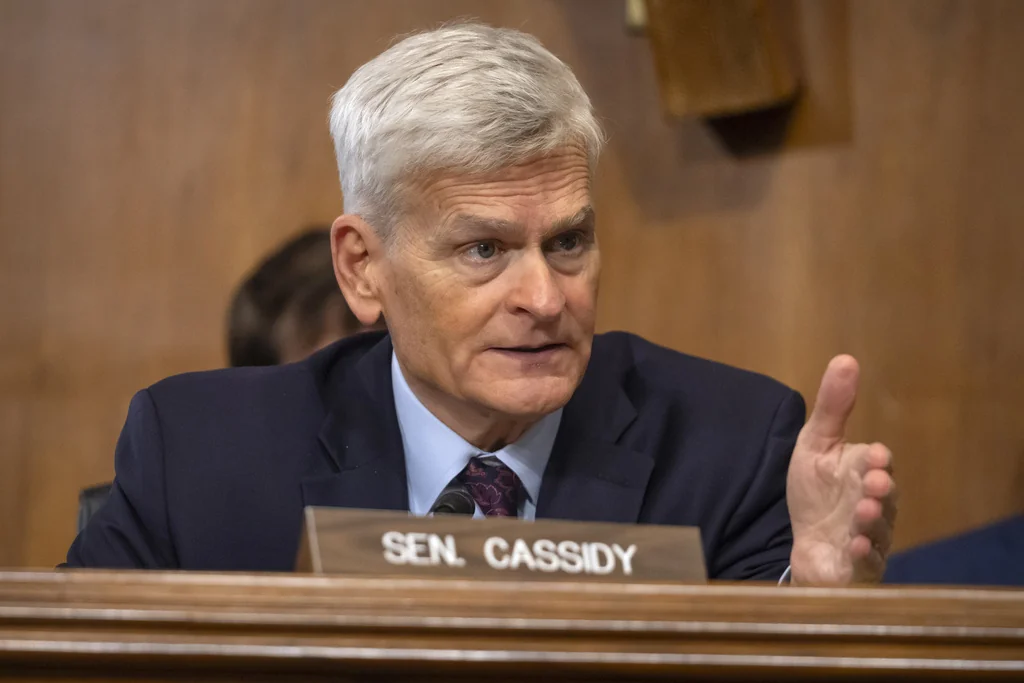Sen. Bill Cassidy (R-LA) will be releasing a plan to improve K-12 outcomes, including increased oversight of education funding and teacher training programs.
The Chairman of the Health, Education, Labor, and Pensions Committee will release a report Friday morning, bemoaning the state of childhood literacy and K-12 schooling generally. Cassidy recommends adopting a more decentralized approach to education to solve the issue, empowering states and parents to adopt flexible methods for individual students.

The report outlined three main policy goals: improving student literacy, strengthening the teacher workforce, and empowering parents.
“The status quo of K-12 education is failing children and families. We are at risk of having an entire generation of children fail to become productive adults if reading proficiency does not improve,” Cassidy told the Washington Examiner in a statement. ”As Chairman of the Senate HELP Committee, I am committed to improving literacy and reforming our education system to put children and families first.”
“Without urgent intervention, we risk raising a generation unequipped to lead, compete, and thrive in the workplace,” Cassidy wrote in the report.
One of the most visible long-term impacts of the COVID-19 pandemic was felt by students, many of whom struggled to adapt to the disrupted structure. As of 2024, two-thirds of American fourth and eighth graders aren’t proficient in reading. So far, only three states — Alabama, Louisiana, and Mississippi — have met or exceeded their 2019 reading levels. As for eighth graders, only Louisiana and the District of Columbia have met or exceeded their 2019 reading levels.
Teachers face their own problems. Data from the National Center for Education Statistics showed that over one-third of teachers are disrespected by students at least once a week and suffer weekly verbal abuse from students in 17% of schools. One in five schools experience physical attacks or fights between students, necessitating a teacher response that leads to burnout.
The training of teachers was a key problem outlined by Cassidy’s report. He argued that current teacher training neglects classroom management skills, lesson delivery, and curriculum development, instead being more “concerned with theory than the practical means of running a classroom.”
“Teacher preparation programs should be about just that – preparing teachers. Instead, a recent report found that radical left-wing ideologies run rampant in the syllabi and course descriptions at colleges of education,” Cassidy wrote.
The Louisiana Republican encouraged states to follow the lead of those who have begun threatening colleges’ accreditation, which don’t properly teach “proven instructional methods.” He argued that these aggressive moves have already shown results in creating more effective teacher prep programs.
Nearly half of teachers believe that the professional development courses offered or demanded by their schools are largely irrelevant. Cassidy recommended increased oversight and guidance for how schools spend federal funds. He argued that federal funding, which accounts for, on average, 7.5% of a school’s budget, comes with too many strings attached and labrynthian rules and regulations. To rectify the problem, Congress should provide increased guidance on the most effective ways to use the funds.
Another key theme in the report was the empowerment of parents. Cassidy argued that parents have to navigate too obtuse a process to get the proper information about their children’s educational outcomes and best practices.
“In all federal policy, the goal should be to enable parents – the ultimate decision-makers to take charge of their child’s education. If we empower them with information about schools, they can pair it with the knowledge they have of their child to make the best decision to meet their student’s needs,” he wrote.
Cassidy pledged to explore updating the Family Educational Rights and Privacy Act, last updated in 1974, to better address parents’ needs.
CASSIDY ARGUES ALLOWING DRUG COMPANIES TO PROFIT HELPS MEDICAL INDUSTRY DISCOVER NEW CURES
Overall, he argued that Congress should consider “removing unnecessary requirements” in order to focus on the “guardrails that are fundamental to success.”
“Are schools teaching students to read and do math? Are they preparing students for the workforce? Are parents in the driver’s seat of their child’s education? By focusing our efforts and empowering state and local leaders to prioritize student outcomes, we can better identify who is doing right by kids and who is not,” Cassidy concluded.















